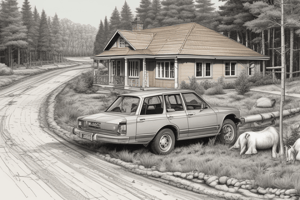Podcast
Questions and Answers
What type of surveying error is characterized by consistent deviations from the true measurement?
What type of surveying error is characterized by consistent deviations from the true measurement?
- Random error
- Calibration error
- Systematic error (correct)
- Blunder / Mistake
Which component is NOT typically found in the upper title block of a cadastral survey plan?
Which component is NOT typically found in the upper title block of a cadastral survey plan?
- Date of survey
- Scale
- Purpose of survey
- Surveyor's name (correct)
Which levelling technique is especially useful for ensuring high accuracy over long distances?
Which levelling technique is especially useful for ensuring high accuracy over long distances?
- Triangulation method
- Total Station technique (correct)
- Simple levelling
- Differential levelling
What equipment is used in conjunction with a Digital Level for accurate surveying?
What equipment is used in conjunction with a Digital Level for accurate surveying?
Which best defines the term 'benchmark' in the context of levelling?
Which best defines the term 'benchmark' in the context of levelling?
In the rise and fall method of levelling, what does the term 'fall' refer to?
In the rise and fall method of levelling, what does the term 'fall' refer to?
Which of the following is NOT a typical use of levelling in surveying?
Which of the following is NOT a typical use of levelling in surveying?
Which of these accessories is used specifically with an Automatic Level?
Which of these accessories is used specifically with an Automatic Level?
What is the primary difference between Plane Surveys and Geodetic Surveys?
What is the primary difference between Plane Surveys and Geodetic Surveys?
Which type of survey is primarily concerned with boundary identification?
Which type of survey is primarily concerned with boundary identification?
Which instrument is best suited for determining vertical angles and heights?
Which instrument is best suited for determining vertical angles and heights?
What is a significant advantage of using GPS over a Total Station?
What is a significant advantage of using GPS over a Total Station?
What kind of maps is prepared by understanding the uses and applications of surveying?
What kind of maps is prepared by understanding the uses and applications of surveying?
What factor does NOT significantly influence route surveys?
What factor does NOT significantly influence route surveys?
Which of the following surveying instruments is mainly used for direct horizontal distance measurement?
Which of the following surveying instruments is mainly used for direct horizontal distance measurement?
Which of the following is NOT a fundamental principle of surveying?
Which of the following is NOT a fundamental principle of surveying?
Flashcards
Levelling
Levelling
The process of determining the relative heights of points on the Earth's surface.
Precision
Precision
A measurement of how close a series of measurements are to each other.
Accuracy
Accuracy
A measurement of how close a series of measurements are to the true value.
Blunders
Blunders
Signup and view all the flashcards
Random Errors
Random Errors
Signup and view all the flashcards
Systematic Errors
Systematic Errors
Signup and view all the flashcards
Benchmark
Benchmark
Signup and view all the flashcards
Cadastral Survey Plan
Cadastral Survey Plan
Signup and view all the flashcards
What is surveying?
What is surveying?
Signup and view all the flashcards
Differentiate between Plane and Geodetic Surveys.
Differentiate between Plane and Geodetic Surveys.
Signup and view all the flashcards
What are Cadastral Surveys used for?
What are Cadastral Surveys used for?
Signup and view all the flashcards
What are Topographical Surveys used for?
What are Topographical Surveys used for?
Signup and view all the flashcards
What are Hydrographical Surveys used for?
What are Hydrographical Surveys used for?
Signup and view all the flashcards
What are Construction Surveys used for?
What are Construction Surveys used for?
Signup and view all the flashcards
What are As-Built Surveys used for?
What are As-Built Surveys used for?
Signup and view all the flashcards
What are the components of the GPS system?
What are the components of the GPS system?
Signup and view all the flashcards
Study Notes
Surveying Definitions and Classifications
- Surveying is the art and science of determining the relative positions of points on the Earth's surface.
- Primary classifications are plane surveying and geodetic surveying, distinct in their approach to Earth's curvature. Plane surveying assumes a flat Earth and is appropriate for smaller areas. Geodetic surveying accounts for Earth's spheroidal shape, used for larger areas.
- Various survey types exist, including cadastral, topographic, hydrographic, construction, and as-built/final surveys. Each type has associated applications.
Survey Types and Applications
- Cadastral/Legal Surveys: Focus on property boundaries, including perimeter, boundary identification, and investigation.
- Topographical Surveys: Map features of the terrain, such as elevation.
- Hydrographical Surveys: Study water bodies.
- Construction/Layout Surveys: Guide construction projects.
- As-Built/Final Surveys: Document completed projects.
- Surveying is used to create topographic, cadastral, and engineering maps; and military maps and reconnaissance.
Surveying Instruments and Equipment
- Instruments and equipment like total stations, GPS, theodolites, steel tapes, fiberglass tapes, levels, and levelling rods are essential for surveying.
- Understanding instrument care and safety procedures is vital.
Techniques and Errors
- Taping techniques and resulting errors are significant aspects of surveying.
- Measuring slopes and errors in pacing measurements are key.
- Advantages and disadvantages of steel tapes and fiberglass tapes must be understood.
- Components of a GPS system (space, control, and receiver components) are key concepts.
- Factors influencing route surveys, including environmental and social impact as well as considerations about terrain, must be assessed.
- Total stations, optical theodolites, and GPS strengths and limitations are crucial knowledge.
- Fundamental principles of surveying, like surveying planning, efficiency and accuracy checking, are pivotal.
History and Units
- Surveying history, from historical tools to modern equipment, should be understood.
- Knowledge of metric and imperial units of measurement is required in all surveying processes.
- Surveying equipment and accessories, including total stations, theodolites, automatic levels, and GPS equipment, are needed to complete all surveys.
Accuracy and Precision
- Understanding accuracy and precision in surveying is important.
- Knowing the different errors in surveying is important, like random errors, systematic errors, and blunders.
Levelling
- Levelling's definition and procedures for setting up and operating levels and levelling rods are essential.
- Associated terminology (backsight, foresight, intermediate sight, datum, reduced level, height of instrument, benchmark, elevation) are critical.
- Applications of levelling include topographic mapping, determining elevations, and calculating volumes.
- Various levelling techniques (simple levelling, differential levelling, total station techniques, and GPS techniques) are crucial.
- Levelling equipment (automatic levels, digital levels, levelling rods) and their associated accessories should be understood.
- Two-peg test procedures, including field procedures and computation using rise and fall methods are necessary.
- Understanding the role of survey departments and planning authorities in subdivision approval processes is essential.
- Calculations associated with reduced level computation using the rise and fall method.
Studying That Suits You
Use AI to generate personalized quizzes and flashcards to suit your learning preferences.





